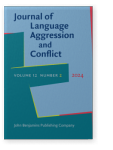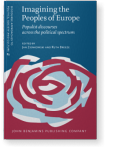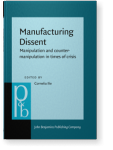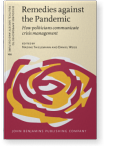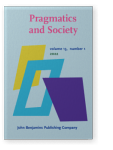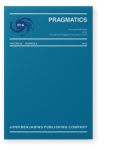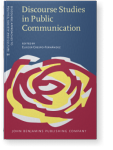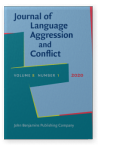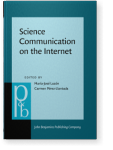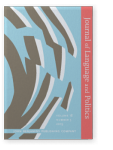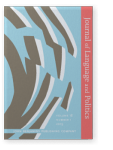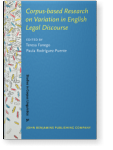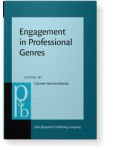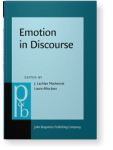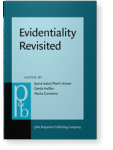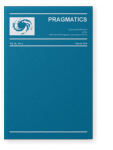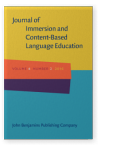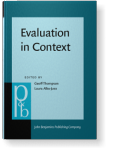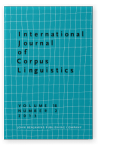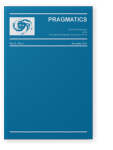Ruth Breeze
List of John Benjamins publications for which Ruth Breeze plays a role.
Journal
Title
Imagining the Peoples of Europe: Populist discourses across the political spectrum
Edited by Jan Zienkowski and Ruth Breeze
[Discourse Approaches to Politics, Society and Culture, 83] 2019. vi, 378 pp.
Subjects Communication Studies | Discourse studies | Pragmatics
2024 Chapter 9. Lessons learned? The role of conventional arguments in avoiding blame and rebuilding trust in banking after the financial crisis Manufacturing Dissent: Manipulation and counter-manipulation in times of crisis, Ilie, Cornelia (ed.), pp. 284–307 | Chapter
The 2008 financial crisis severely undermined public trust in banking systems, prompting calls for widespread reform. However, irregularities continued, leading to a further succession of scandals over the following years. We should therefore ask how banks justified the catastrophe and their… read more
2024 Is this War? Naming the Russia-Ukraine dispute in three international news providers Journal of Language Aggression and Conflict: Online-First Articles | Article
Media discourse around particular subjects comes to shape people’s understanding of that topic. In particular, the words used to describe situations of violence and conflict may colour public perceptions. This paper identifies the main words used to describe the Russia-Ukraine conflict by three… read more
2023 Exploiting the crisis: Populists, migration, minorities and Covid-19 Remedies against the Pandemic: How politicians communicate crisis management, Thielemann, Nadine and Daniel Weiss (eds.), pp. 276–298 | Chapter
The Covid-19 pandemic posed many problems for politicians worldwide, but it also offered an opportunity for some politicians of a populist nature to exploit public fears and tensions by scapegoating migrants, minorities or other countries. In this chapter we follow Moffitt’s (2016) analysis of… read more
2022 Performing right-wing political identities on reader comments pages Pragmatics and Society 13:1, pp. 85–106 | Article
Recent discourse research has examined the rise of right-wing populism. Yet the predominant focus on political parties and politicians means that we know less about how right-wing identities are performed among ordinary people with different degrees of political engagement. This paper examines… read more
2021 Understandable public anger: Legitimation in banking after the 2008 crisis Pragmatics 31:4, pp. 483–508 | Article
In the ten years from 2008 onwards the banking sector was constantly in the spotlight. Blame for the financial crisis and concern regarding controversial government bailouts were followed by public outrage about inflated bonuses, money laundering and false reporting. Over this period, banks… read more
2021 Chapter 1. Imagining the nation in British politics Discourse Studies in Public Communication, Crespo-Fernández, Eliecer (ed.), pp. 15–38 | Chapter
In European politics today, the issues of nationalism and populism are attracting considerable research attention. However, most discourse studies have either focused exclusively on far-right politics, or have looked at populism at both extremes of the political spectrum. In this chapter, I… read more
2020 Angry tweets: A corpus-assisted study of anger in populist political discourse Journal of Language Aggression and Conflict 8:1, pp. 118–145 | Article
The rise of populism has turned researchers’ attention to the importance of affect in politics. This is a corpus-assisted study investigating lexis in the semantic domain of anger and violence in tweets by radical-right campaigner Nigel Farage in comparison with four other prominent British… read more
2019 Chapter 6. Continuity and change: Negotiating relationships in traditional and online peer review genres Science Communication on the Internet: Old genres meet new genres, Luzón, María José and Carmen Pérez-Llantada (eds.), pp. 107–130 | Chapter
The move to new open access formats in scientific peer review is thought to have influenced the way referees and authors interact. This chapter considers the genre of author responses to referees in terms of relational work, and compares published responses in an anonymized online open access… read more
2019 Fixing points on a shifting landscape: Truth, lies and politics in two reader comments pages Journal of Language and Politics 18:1, pp. 1–20 | Article
This paper focuses on reader comments published in two online UK newspapers (Mail Online and Independent) in response to articles about one discreditable incident involving a far-right political leader. The concepts of articulation and fixation are used to examine how these readers engage with… read more
2019 Chapter 4. Part-of-speech patterns in legal genres: Text-internal dynamics from a corpus-based perspective Corpus-based Research on Variation in English Legal Discourse, Fanego, Teresa and Paula Rodríguez-Puente (eds.), pp. 79–104 | Chapter
Four corpora constructed from different genre families in business law (academic texts, case law, legal documents, and legislation) are analysed in terms of key parts of speech. The differences between them show that legal academic writing and case law tend to follow patterns comparable to… read more
2019 Chapter 11. Recruitment websites and the socialization of new employees: Dialogicity and graduation Engagement in Professional Genres, Sancho Guinda, Carmen (ed.), pp. 197–216 | Chapter
The complex culture of the large corporation today is mainly shaped by persuasive rather than coercive means. In its messages, the company moulds its own identity and proposes roles for the different players through discourse, providing the information that is considered appropriate to each… read more
2019 Concluding remarks: Appealing to the people Imagining the Peoples of Europe: Populist discourses across the political spectrum, Zienkowski, Jan and Ruth Breeze (eds.), pp. 363–371 | Chapter
2019 Chapter 5. Expressing emotions without emotional lexis: A crosslinguistic approach to the phraseology of the emotions in Spanish and English Emotion in Discourse, Mackenzie, J. Lachlan and Laura Alba-Juez (eds.), pp. 113–138 | Chapter
Cross-linguistic studies of phraseology enable us to draw increasingly accurate maps of the specific ways different languages express emotions. This chapter focuses on the phraseology used to express emotions in Spanish, taking English as its point of comparison. We situate the topic within the… read more
2019 Introduction: Imagining populism and the peoples of Europe Imagining the Peoples of Europe: Populist discourses across the political spectrum, Zienkowski, Jan and Ruth Breeze (eds.), pp. 1–18 | Chapter
2017 Exploring evidential uses of the passive of reporting verbs through corpus analysis Evidentiality Revisited: Cognitive grammar, functional and discourse-pragmatic perspectives, Marín-Arrese, Juana I., Gerda Haßler and Marta Carretero (eds.), pp. 297–313 | Article
One feature which has interesting evidential implications in English is the passive form of verbs of saying or thinking. Corpus evidence is used to trace the evolution of the most frequent passive structures of this kind over the last two hundred years, and to explore changes in their use.… read more
2016 Negotiating alignment in newspaper editorials: The role of concur-counter patterns Pragmatics 26:1, pp. 1–19 | Article
Newspaper editorials are shaped by the need to negotiate alignment and rapport with a diverse readership. This is achieved partly through the resources of engagement (Martin and White 2005), that is, through the argumentative moves of disclaim, proclaim, entertain and attribute, by which dialogic… read more
2014 Multimodal analysis of controversy in the media Evaluation in Context, Thompson, Geoff † and Laura Alba-Juez (eds.), pp. 303–320 | Article
In a world dominated by the Internet, it is becoming increasingly important to develop analytical tools that can take in multiple dimensions of media texts. This chapter presents a multimodal analysis of a corpus of online newspaper texts about controversies surrounding the wearing of religious… read more
2013 Lexical bundles across four legal genres International Journal of Corpus Linguistics 18:2, pp. 229–253 | Article
Legal language is often said to be formulaic, but little research is available on the nature of frequently occurring sequences of words in different legal genres. This article investigates the lexical bundles found in four legal corpora: academic law, case law, legislation, and documents. Major… read more
2011 Critical discourse analysis and its critics Pragmatics 21:4, pp. 493–525 | Article
This article briefly reviews the rise of Critical Discourse Analysis and teases out a detailed analysis of the various critiques that have been levelled at CDA and its practitioners over the last twenty years, both by scholars working within the “critical” paradigm and by other critics. A range of… read more
